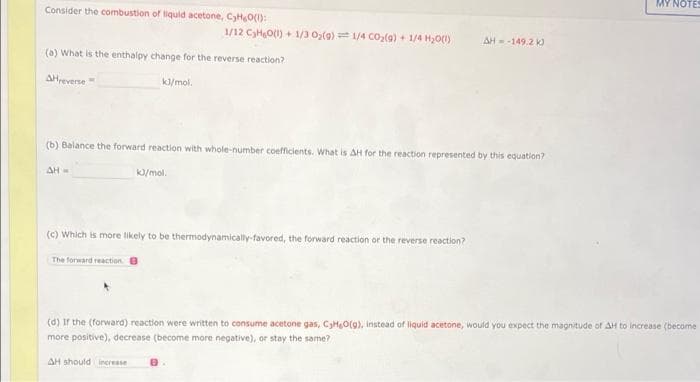MY NOTES Consider the combustion of liquid acetone, CyHO(): 1/12 CHO1) + 1/3 0,(0) = 1/4 Co,(9) + 1/4 HO(1) AH-149.2 k (a) What is the enthalpy change for the reverse reaction? AHreverse kl/mol. (b) Balance the forward reaction with whole-number coefficients. What is AH for the reaction represented by this equation? AH= k/mol. (c) Which is more likely to be thermodynamically-favored, the forward reaction or the reverse reaction? The forward reaction (d) If the (forward) reaction were written to consume acetone gas, CyHgO(g), instead of liquid acetone, would you expect the magnitude of AH to increase (become more positive), decrease (become more negative), or stay the same? AH should increese
Thermochemistry
Thermochemistry can be considered as a branch of thermodynamics that deals with the connections between warmth, work, and various types of energy, formed because of different synthetic and actual cycles. Thermochemistry describes the energy changes that occur as a result of reactions or chemical changes in a substance.
Exergonic Reaction
The term exergonic is derived from the Greek word in which ‘ergon’ means work and exergonic means ‘work outside’. Exergonic reactions releases work energy. Exergonic reactions are different from exothermic reactions, the one that releases only heat energy during the course of the reaction. So, exothermic reaction is one type of exergonic reaction. Exergonic reaction releases work energy in different forms like heat, light or sound. For example, a glow stick releases light making that an exergonic reaction and not an exothermic reaction since no heat is released. Even endothermic reactions at very high temperature are exergonic.

Step by step
Solved in 4 steps with 4 images









